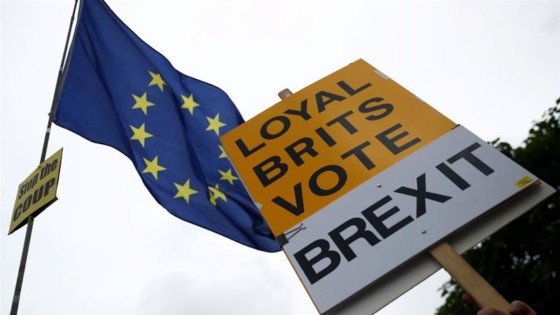By Morak Babajide-Alabi BREXIT : The United Kingdom bowed out of the continental European Union on Friday, January 31, 2020. For some of t...
By Morak Babajide-Alabi
BREXIT: The United Kingdom bowed out of the continental European Union on Friday, January 31, 2020. For some of the citizens, this was a significant victory that called for celebrations. For whatever it is, it was the beginning of a new chapter in the history of Great Britain. This day marked the end of some deals and the negotiation of unfamiliar ones. It annulled a long-term association with twenty-seven other European countries. This status also opens up other opportunities with new partners. It is indeed a new beginning.
Friday night felt like Independence Day for a “kingdom” that once “dished sovereignty” to countries that it colonised. The celebration at Parliament Square was as it was in Accra in 1960. I imagined the joy of freedom that the Africans must have felt when they were told by the British masters that they could govern themselves. On Friday, I endured the pains of Africans who were colonised against their wishes. I wondered to myself that if the streets of the UK could be this lit up for the disengagement from the EU how colourful would the streets of cities ion Africa had been in the sixties. Let us bear in mind that the membership of the EU was voluntary, unlike colonialism.
As it was for the Africans, it was not straightforward for the British to get to this point. The journey had been arduous, with many bumps and potholes on the way. There were divisions, blackmails and scaremongering from all quarters. It was hard to watch as politicians tore into each other, formed alliances, burnt bridges and shouted the loudest either in support or against the move. But, the difference with the Africa situation was that the other 27 EU leaders did not play “divide and rule” game with the British. This, unfortunately, was the hallmark of colonialism in Africa and other territories.
As it was in Africa in decades gone by, many gave up on the possibility of the UK leaving the EU. The process was arduous and painfully slow. Politicians were accused and condemned of hidden plans to circumvent the wishes of the people. The absence of violence in the quest for freedom represents the opposite of the experience of Africans who were killed, cowed and maimed for demanding self-rule from the colonial masters.
READ ALSO: Stop feeding Imo people with lies, Ihedioha tells Uzodinma
On Friday night, there were events to celebrate and mourn the exit of the UK from the EU, depending on what side of the debate you were. In Parliament Square and a few cities, the hurts and the divisions were put aside to usher in a new era. Yet, for some, the current era is a mistake of the century. Up in the Scottish capital, Edinburgh, the defiant voices came out to sing. The citizens huddled together in the cold, heads bowed as they contemplate their future existence in the UK and outside the EU. They could not suppress their anger at squandering the opportunity of independent Scotland in 2014.
At Parliament Square, thousands gather to celebrate. The “songs of freedom” were loud and clear. The speakers, like the crowd, barely made any effort to conceal their excitements of a New Britain. They counted down to the independent United Kingdom. Speaker after speaker listed the many gains of the UK outside the EU.
Indeed, BREXIT meant BREXIT. The crowd visualised the numerous jobs that would be available to the locals. You could see the relief on the faces of many – no more EU citizens to “steal our jobs.” They looked forward to the enormous savings of £350 million per week, as claimed by the Leave supporters in 2016. Imagine what this money would mean to the UK. They recollected the words of Boris Johnson and thought to themselves that, indeed, “it would be a fine thing, as many of us have pointed out, if a lot of that money went on the NHS.” The dreams are about to become reality. In the new UK, there won’t be any more NHS waiting times or elderly patients lying unattended on trolleys. Because the EU citizens would have cleared out.
No. Just joking. The event brought out the nationalist fervour in the citizens. This is understandable. The EU project was not one that was bought into by all Britons. Right from the start in 1973, there had been critics who believed it was an ominous mistake on the path of the government of Conservative Prime Minister Edward Heath. It was thus ironic that the exit of the UK was negotiated at various times by three Conservative Prime Ministers.
The “dream” to the exit was conceived by David Cameron as a vote-catching campaign strategy. It was to pacify the agitated Tory MPs and supporters who wanted him to commit on a stand towards EU. Moreover, the United Kingdom Independence Party (UKIP), led by Nigel Farage, had become popular and more nationalist in outlook. The new UKIP was a delight of the British public and threatening the Tories. Cameron knew he had to take a stand. He promised a vote in 2017, by which time he would be in his second term in office.
There was pressure on Cameron, and he had to call for the referendum a year early. The rest is history as the British people voted in favour of an exit. It was a shocking result. Cameron took a gamble and he lost. This decision cost him the Premiership. Theresa May took over the reins of power and tried to make something out of BREXIT. Her efforts ended in tears as she was frustrated out of office by Parliamentarians bent on ending BREXIT. There was not much sympathy for May though, as she was an undeserving beneficiary of the fallout of BREXIT. She was a Remainer.
But there was a man who desired BREXIT and was hungry for it – Boris Johnson. Added to this was his ambition to govern the country. This allowed him the edge, and after many shuffles and shifting, he won the voters over in the 2019 General Election. So for him, Friday was a fulfilment of an ambition to be the leader to steer his country out of the EU. He succeeded where his predecessors failed.
Johnson was not the lone Briton with the anger and desire to get out of the UK. Nigel Farage, the leader of the BREXIT Party, could not hold off his excitement. He has been credited in many quarters as the man who started Britain on the course to disassociation from Europe. He was not a fan of the EU. He seized the opportunity on the date the final Withdrawal Bill was rubber-stamped by the EU countries. He had said: ‘I’ve been campaigning for this for 27 years, 20 of them in this parliament, and sometimes as a human being if you want something so badly it’s almost difficult to believe it’s really happening…”
Whichever way one views it, the exit remains a massive event that will be on the lips of many people for years to come. The date will be passed down from generation to generation. The stories of the struggles, the fights, the desires, the resignations, the dramas and the numerous name callings between political and economic players will be subjects of discussions in years to come. They will be bedtime stories told to the young ones, while the young adults (by luck) will recollect faintly how their grandparents were glued to the television sets watching the drama in the parliaments.
It is not yet the end for BREXIT, but it is the start to the end. Officially, the UK is out of the EU, but technically, it is still part of it. The British Jack was lowered at the European Parliament building in Brussels on Friday. The political victory of BREXIT is won, but the hard work starts instantly. The next eleven months would be fascinating times for the UK and EU leaders as they meet to chart the course for the future. If for nothing else, the UK will soon be free from EU laws (economic, judiciary and political), which many have argued in the past had bound the country. This is the defining time for the UK.
The post BREXIT is the same as independence for Africans appeared first on Vanguard News.


No comments